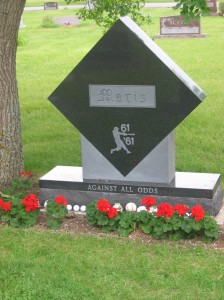It was 50 years ago this week that Roger Maris hit his 61st home run of the season into the Yankee Stadium seats. There were only 23,000 fans in attendance to see the historic event and they were less than enthusiastic. Why? Because in their eyes, the wrong Yankee had just beaten Babe Ruth’s 34-year old record. Yankee fans were in love with Mickey Mantle and wanted him to break the record, but the Mick ended the season with 54 homers. The other half of the M&M Boys, Roger Maris was the guy who hit 61. New Yorkers never really counted Maris as a true Yankee – after all he didn’t originate from within the system like Lou Gehrig, Joe DiMaggio and Mickey Mantle.
Yet Maris’s record would last for 37 years, until the bulging biceps of Mark McGwire and Sammy Sosa would eclipse that feat in 1998. Of course McGwire and Sosa are now tainted with the stigma of performance-enhancing drugs, as is Barry Bonds, who set the single season home run record with 73 in 2001.
Many baseball purists believe Maris should be credited with the single season record. But even that is controversial. For every heroic deed it seems there must be an anti-heroic force trying to undermine it. And in 1961 it was Ford Frick, the all-powerful commissioner of baseball. Frick was a baseball traditionalist who idolized Babe Ruth, who hit 60 home runs in 1927, when the baseball season was just 154 games long.
Baseball expanded its season from 154 games to 162 in 1961 in order to add two new teams – the Los Angeles Angels and the Washington Senators. But because Roger Maris hit his 61st homer on the last game of the season, Frick declared his record should be marked by an asterisk * to indicate that Babe Ruth – and not Roger Maris – was the real home run king.
Never mind the fact that Maris had missed a couple of games and ended up with only seven more at bats in 1961. Frick was determined to slight the Bronx Bomber with a lesser achievement. It wasn’t until many years later that a new baseball commissioner by the name of Fay Vincent would remove the asterisk from the record books forever, crediting Roger with the glory he so justly deserved.
Roger Maris is buried in his home town of Fargo, North Dakota. I visited his burial site several years ago with my son Matt, who spotted Maris’s diamond-shaped gravestone.
As we got closer, I noticed it said “Maris” on it, with the words “61 in ’61” etched into the marble, along with the phrase, “Against All Odds” – the same words inscribed on a plaque in Yankee Stadium.
As I walked closer I noticed a dozen baseballs at the base of the grave, each of them a gift from fans, offering a simple tribute to the man who symbolized Fargo in death as in life.
Kneeling at the gravesite, I was overcome with emotion. Here was the burial spot of the man who had won the American League MVP award in 1961. As a right fielder, Maris had a powerful arm that could gun down any runner who tried to score from second base. More than anything, Maris wanted to be known as a complete ballplayer and not just a home run hitter.
I silently thanked Roger for all the great baseball memories he had provided me in my youth – how he and Mickey, “the M&M Boys,” had enriched my life with the love of baseball.
“Thanks for giving me a passion for the game,” I whispered to Roger’s grave. “And thanks for being a dedicated dad and devoted family man – that’s truly the greatest accomplishment any man can achieve,” I said silently.
Here we are in the hunt for October’s grand prize – the World Series trophy, but I’ll be thinking about Roger Maris – and how he hit that 61st home run on October 1, 1961 – a feat that is overlooked by many, but something true baseball fans should never forget.
You can read much more about Roger Maris in Baseball Between Us, which will be released on March 1, 2012.

